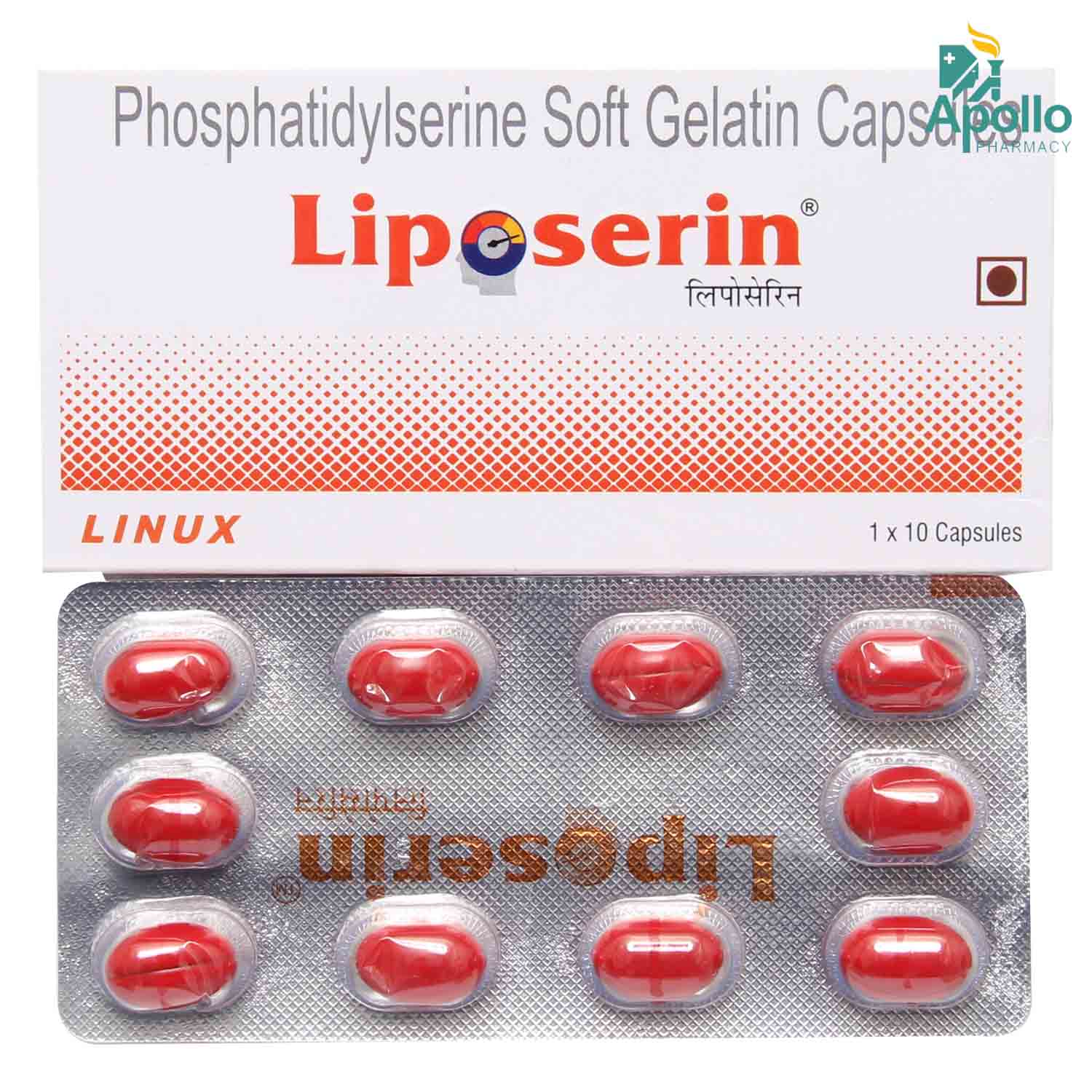Phosphatidylserine
About Phosphatidylserine
Phosphatidylserine belongs to a class of medications known as dietary supplements used to treat Alzheimer's disease as well as age-related decline in memory and cognitive abilities. Alzheimer's disease is a neurological ailment that causes dementia (memory loss) leading to the loss of the ability to think, learn, communicate, and manage daily tasks.
Phosphatidylserine contains phosphatidylserine, a phospholipid nutrient. It works by restoring the acetylcholine release and maintaining an adequate supply, improving endogenous choline availability, which is vital for cognitive processes. Thus it helps to treat Alzheimer's disease and cognitive abilities.
Take Phosphatidylserine as instructed by the doctor. You should take Phosphatidylserine for as long as your doctor advises, depending on your medical condition. Common side effects such as sleeplessness and stomach discomfort, or abdominal pain may occur in some circumstances. The majority of these side effects do not necessitate medical attention and resolve gradually over time. However, if you are experiencing these side effects on a regular basis, you should consult your doctor.
Before taking Phosphatidylserine, inform your doctor about your medical history and other medications you are currently taking to rule out any potential negative effects. If you experience an allergic response to any of its constituents, please notify your doctor. Consult your doctor if you are pregnant or breastfeeding. Limited information is available for the use of Phosphatidylserine in paediatric patients. Please seek the advice of a medical professional.
Uses of Phosphatidylserine
Medicinal Benefits
Phosphatidylserine is a dietary supplement used to treat Alzheimer's disease and age-related impairments in memory and cognitive functions. Phosphatidylserine contains phosphatidylserine, a phospholipid nutrient. It works by restoring the acetylcholine release and maintaining an adequate supply, improving endogenous choline availability, which is vital for cognitive processes. Thus it helps to treat Alzheimer's disease and cognitive abilities.
Directions for Use
- Phosphatidylserine can be taken with or without food, though taking it with meals may enhance absorption.
- Follow your doctor’s instructions on the dosage and timing of this medication to ensure its safety.
- Swallow Phosphatidylserine as a whole with a glass of water.
- Do not chew, crush, or break it.
Storage
Side Effects of Phosphatidylserine
- Sleeplessness or insomnia
- Stomach discomfort or abdominal pain
Drug Warnings
Do not use Phosphatidylserine without the doctor's advice if you had an allergic reaction to any medicine or soy and fish. Consult your doctor if you are pregnant or breastfeeding. Excessive alcohol use increases the chance of neurological system damage, including brain damage; therefore, it is better to prevent or limit alcohol usage. Limited information was available for the use of Phosphatidylserine in paediatric patients, please consult the doctor. Before taking Phosphatidylserine, inform your doctor about your medical history and other medications you are currently taking to rule out any potential negative effects.
Drug Interactions
Drug-Drug interactions: Phosphatidylserine may interact with cholinergic/anticholinergic medications (e.g. acetylcholine, carbachol, methacholine).
Drug-Food Interactions: No interactions found.
Drug-Disease Interactions: No interactions found.
Drug-Drug Interactions Checker List:
Safety Advice

Alcohol
cautionLimit or avoid the consumption of alcohol. Excessive alcohol consumption raises the risk of damaging your neurological system, including your brain.

Pregnancy
cautionPlease consult a healthcare professional. There are no adequate and well-controlled studies on pregnant women. Your healthcare professional will only recommend if the benefits outweigh the risks.

Breast Feeding
cautionConsult your healthcare professional as there is no significant research yet on the use of Phosphatidylserine in lactating mothers.

Driving
cautionPhosphatidylserine does not impact your ability to drive or operate machinery.

Liver
cautionLimited information about the use of Phosphatidylserine in patients with liver illness or impairment is available. Please check with the doctor. Your doctor will recommend if the benefits outweigh the risks.

Kidney
cautionLimited information about the use of Phosphatidylserine in patients with kidney illness or impairment is available. Please check with the doctor. Your doctor will recommend if the benefits outweigh the risks.

Children
cautionLimited information is available about the use of Phosphatidylserine in paediatric patients. Please consult a doctor. Your doctor will only recommend if the benefits outweigh the risks.
Habit Forming
Diet & Lifestyle Advise
- Maintaining a healthy lifestyle benefits overall health and may protect the brain.
- Create a sleep schedule to aid in relaxation and stress alleviation.
- Consume greens, leafy vegetables, and other non-starchy vegetables (tomatoes, broccoli, and cauliflower).
- Consume a nutritious, well-balanced diet including at least five servings of fruits and vegetables every day.
- Strawberries, blueberries, blackberries, and almonds can aid to reduce inflammation in the brain.
- Use extra virgin olive oil. It has a lot of healthy fats, which are good for your brain.
- Consume whole grains high in nutrients, such as oats, quinoa, and brown rice.
- Take fish oil or eat fish at least once a week (ideally fatty fish like salmon, sardines, trout, and tuna). They contain many omega-3 fatty acids, which are essential for normal brain function.
- The best approaches to lessen the risk of problems are quitting smoking and avoiding drinking alcohol.
Patients Concern
Disease/Condition Glossary
Alzheimer's disease: Alzheimer's disease is a neurological ailment that causes memory loss and eventually kills the capacity to think, learn, communicate, and conduct daily activities. It is the most prevalent cause of adult memory loss (dementia).
Memory loss (Dementia): It is a loss of cognitive function that includes recalling, thinking, and reasoning. This condition is caused by aberrant brain cell function and a breakdown in communication between them. Individual age, family history, and genetics are the risk factors.
FAQs
Phosphatidylserine belongs to a class of medications known as dietary supplements used to treat Alzheimer's disease as well as age-related decline in memory and cognitive abilities.
Phosphatidylserine contains phosphatidylserine. It works by restoring the acetylcholine release and maintaining an adequate supply, improving endogenous choline availability, which is vital for cognitive processes. Thus it helps to treat Alzheimer's disease and cognitive abilities.
It is not recommended to take Phosphatidylserine on your own to treat Alzheimer's disease or any other medical condition without first consulting a doctor. Taking it on your own can have negative side effects.
Alzheimer's disease currently has no cure. However, Phosphatidylserine can temporarily relieve the symptoms.
If Alzheimer's disease occurs in people under 65, it is known as early-onset Alzheimer's disease. It happens to one out of every twenty patients.
The main ingredient in Phosphatidylserine is phosphatidylserine itself, a phospholipid nutrient. Phospholipids are essential components of cell membranes and play a crucial role in cell structure and function.
Phosphatidylserine is usually vegetarian-friendly since they're often made from plant-based sources like soy, making them ideal for those following a vegetarian diet. Always refer to a product label once.
This supplement may offer several potential benefits, including improved cognitive processes and treatment of Alzheimer's disease. By containing phosphatidylserine, it may help improve memory and cognitive decline associated with ageing. Additionally, it restores acetylcholine release and maintains endogenous choline availability, both essential for cognitive function. Overall, this supplement may be valuable for supporting brain health. However, consulting a healthcare professional is necessary.
The most common side effects of the Phosphatidylserine are sleeplessness or insomnia, stomach discomfort or abdominal pain. These side effects are usually mild and temporary, resolving as your body adjusts to the medication. However, if any side effects persist or worsen, you must consult your doctor for proper guidance and care.
Consult your doctor before taking Phosphatidylserine if you're on blood-thinning medications. Combining them may increase bleeding risk, requiring careful monitoring and potential dosage adjustments.
Store Phosphatidylserine in a cool, dry place, away from direct sunlight and moisture. Keep them tightly sealed and out of reach of children.




